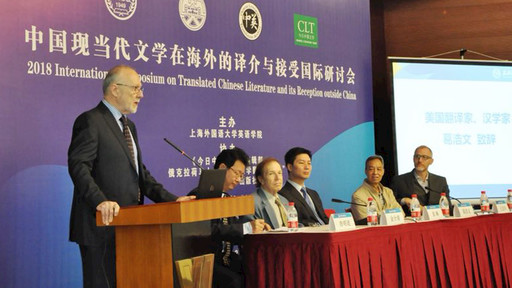Translated Chinese literature goes global
Author : ZHA JIANGUO and TONG WEI Source : Chinese Social Sciences Today 2018-10-21

On Sept. 28, the “2018 International Symposium on Translated Chinese Literature and its Reception outside China” was hosted by the School of English Studies at Shanghai International Studies University (SISU). Over 130 experts attended the symposium. Howard Goldblatt, a renowned American translator and sinologist, delivers a speech at the opening ceremony. Photo: SISU
Recently, the “2018 International Symposium on Translated Chinese Literature and its Reception outside China” was hosted by the School of English Studies at Shanghai International Studies University (SISU) in Shanghai.
The translation, dissemination and research of contemporary Chinese literature plays a significant role in helping the world understand contemporary China and facilitating cultural exchanges between China and foreign countries. Zhang Feng, vice president of SISU, said that contemporary Chinese literature reflects the lives, ideas and feelings of contemporary Chinese and is also a vivid portrait of their empirical and spiritual world.
The promotion and reception of translated Chinese literary works overseas since reform and opening up has facilitated communication among the communities of translation, publication and academia and among authors, translators and readers. This has advanced the translation and study of contemporary Chinese literature, the reflection on how to make Chinese literature and culture go global, and the introduction of Chinese literature into foreign readers’ views and thinking, Zhang said.
Zha Mingjian, dean of the School of English Studies at SISU, said that the translation of contemporary Chinese literature has two systems: domestic translation and foreign sinologist translation.
The studies on translated contemporary Chinese literature should go beyond studies on translation strategies and extend to factors outside of the text itself. For instance, Zha continued, more studies should be conducted on the relationship between a translator’s view on literature and his or her choice of translation strategies, on the relationship between the promotional strategies adopted for a translated work and its reception, and on the image of contemporary China presented by these overseas translated literary works.
Howard Goldblatt, an American translator and sinologist, said that translation should be inclusive and shouldn’t be divided. Literary translation is meaningful and valuable as it is beneficial to the common people and the literature cause; it can heal hearts and facilitate exchange between different cultures. But translation is also an arduous job. As an agent of the author, the translator must serve both the author and readers. How to strike a balance and do a good job is an enormous challenge for translators.
The translation and publication of Chinese literature shoulders the responsibility of helping Chinese culture go global, and the key is improving the translation quality and reception of the works, as well as improving the publication and dissemination strategies. Wang Yingchong, an associate professor of the School of English and International Studies at Beijing Foreign Studies University, said that traditionally published translated literary works need to interact more with other media, including with periodicals, film and television, and online platforms.
The translation of literary works is not only conversion between languages but across cultures. Li Mei, an associate professor of the School of Journalism and Communication at SISU, said that in promoting the going global of Chinese culture, the achievements of translating Chinese literature for overseas readers are undeniable. To extend the vitality of contemporary Chinese literary works in foreign culture, translators must try to overcome many barriers in language, religion, aesthetics and so on to make the translated works more acceptable for Western readers. Li pointed out that translators should take a neutral stance and try to find the common ground between Eastern and Western culture so that Western readers might take further interest in Eastern culture.
Ye Shengtao made Chinese fairy tales from a wilderness
Ye Shengtao (1894–1988) created the first collection of fairy tales in the history of Chinese children’s literature...
-
How northern ethnicities integrated into Chinese nation
2023-09-18
-
Mogao caves
2023-09-12
-
Mogao Grottoes as ‘a place of pilgrimage’
2023-09-12
-
Time-honored architectural traditions in China
2023-08-29
-
Disentangling the civilizational evolution of China
2023-08-28
-
AI ethics in science fiction
2023-08-23














 2011-2013 by www.cssn.cn. All Rights Reserved
2011-2013 by www.cssn.cn. All Rights Reserved